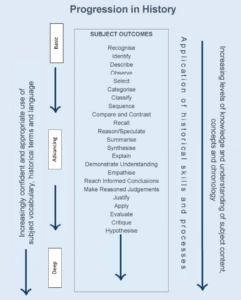- Kendal,
- Cumbria LA8 9LB
Subject Leader: Miss Mia O’Callaghan
Intent
At Selside School, the history curriculum is strongly linked to our term-time class topics and is shaped to ensure it is inclusive of all learners. History helps the children to gain the knowledge and skills that are needed to make thoughtful observations and judgements about our past. We aim to inspire the children’s curiosity by using an enquiry-based approach in our learning. We provide a broad, balanced and differentiated history curriculum that encompasses British Values. History has meaningful links to other subjects such as Reading, Writing, Geography and Art and Design.
Implementation
We use the Collins Connected History units to support teaching and learning which we have linked to local history events. The Connected History enquiries ensure that pupils are progressively challenged to achieve more demanding outcomes as they become more mature learners – progression which reflects increasing mastery of the subject looking at 4 Key learning indicators which are the golden thread that weave through our history curriculum:
We recognise that whilst it is important for pupils to increase and extend their knowledge of the subject, it is also vital that they have space and time to develop the concepts and skills of young historians. Important subject knowledge is implicit in each enquiry, but this is balanced with adequate time and opportunity for pupils to master key subject skills and outcomes by ‘doing less better’. We break topics in to key concepts to focus on:


Connected History recognises that increasing mastery of the subject occurs as a result of a pupil combining the application of key subject skills, processes and subject vocabulary with the development of knowledge and understanding. These are interdependent components of a pupil developing the attributes of a young historian and are illustrated on the next page:

History Long Assessment & Vocabulary Progression
What does history look like in the EYFS
Primary National Curriculum – History
Enrichment and Culture Capital
History is an important part of our curriculum, as it enables the children to form links between the past and the present. Through doing this, they are able to show friendship by working together and discussing ideas about what and why things happen. They show respect by gaining an understanding of morality and learning about different people’s perspectives, identifying where different choices could lead to different outcomes. Furthermore, they are able to develop a better understanding of our multicultural society by studying comparisons between local, British, European and world history. Our children are able show courage in their learning by forming and expressing their own opinions about how our history has shaped us. Our history curriculum also provides many opportunities for children to experience history outside the classroom. School trips include visits to local museums, national museums and historical sites. We also celebrate historical dates, such as poppy day, where the children express thankfulness towards our ancestors.
Impact
We want our Pupils to become Historians who have:

